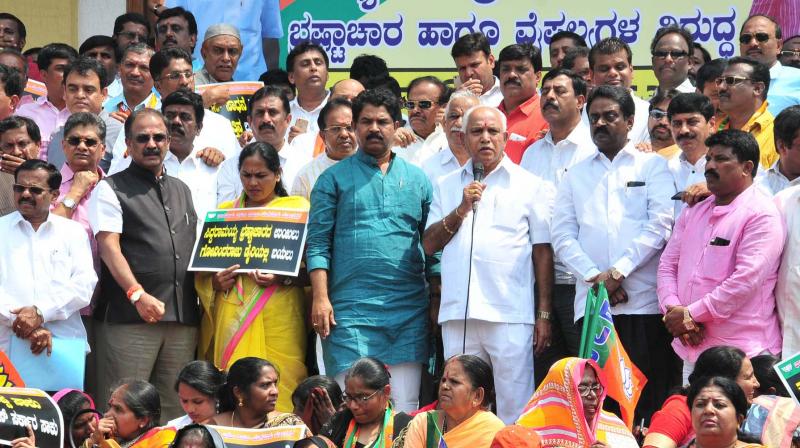Congress needs youth, but wisdom of age too
So far, it has not come out with a shred of evidence to nail the government or the ministers.

As the Congress government in Karnataka prepares to mark four years in office, we see the opposition BJP stepping up its campaign against the Congress party and the government, although it has no moral edge to talk about the party or any of its leaders. So far, it has not come out with a shred of evidence to nail the government or the ministers.
At the same time, some developments within the party are perplexing such as talk about the party taking action against leaders like B. Janardhan Poojary or A.H.Vishwanath, who admittedly have been critical of the government for quite some time. I wonder what they believe they can achieve by publicly attacking the Chief Minister. Who are they addressing?
Like many serving the party and the government, the contribution of these two Congressmen to building the party in the state, as ministers and otherwise, cannot be denied. Which makes one wonder what stopped them from raising their demands and concerns in a full-fledged meeting of the executive committee of the Party.
For over five years or so, there has, no doubt, been much discussion within the party of harnessing the potential of youngsters in the Party. Considering the growing numbers of young people interested in politics, it makes eminent sense to involve youngsters in political activity. But does this mean that the party should dump the seniors who have vast experience in politics and governance?
Strangely, the other two parties in the state have not witnessed such a churning here. A political party cannot afford to give the impression that it has rejected or sidelined the seniors. Here the party has to strive for a balance between the energy and enthusiasm of the young, and the experience and knowledge of the seniors.
Several youngsters, as I have seen, expect – even demanded power soon after they get into the Party. Those with a professional or technical education tend to be quite different, but how many of them would like to come in? There isn’t even preliminary brainstorming on why the nearly 38 lakh educated, urbanised, aspiring youth in Karnataka voted Mr. Narendra Modi – and not the BJP – in the 2014 election.
I have benefited from my interface with this aspirational class, and so will the Party, if we can scale up the interaction to a campaign level – what with the BJP not even convincingly claiming, that they have achieved anything significant, let alone its failure with demonetisation. We have not even got into this kind of an issue.
As a Party we should have worked out a sensible party-government equations; when the Party’s government itself is in place. While no Government would like its own party to indulge in a public critique of its governance, the party would do well to assess with some rigour the functioning of the government in a closed door discussion and share it with the government.
After all, it is the party which has to face the electorate next time around. As a Party we could have advised the government in May 2013 that a periodical assessment mechanism could be useful.
In the absence of a functioning State Planning Board, it would have been useful for the party to have a platform, something like the National Advisory Council. In the absence of such a group, the government would be compelled to rely on the bureaucracy to work out the intricacies of Policies. This task is quite different from that of the ‘Co-ordination’ committee.
It is also a pity that we did not attempt an analysis of the 2013 Assembly elections where some of us faced serious problems from colleagues at the constituency level. That the national level policy making platform, the Congress Working Committee did not also give us the benefit of any analysis of the 2014 Parliamentary elections is a matter of regret.
Being the only large non-BJP government we should have focussed on the ideological element in the implementation of programmes and secularism. While Anna Bhagya, Ksheera Bhagya and such other excellent schemes are entirely pro-poor, the legislation on SC-ST development and the huge budgetary grant for it, is a crucial programme of the government.
These should have been complemented with quick decisions on issues such as the removal of prejudiced saffronised texts in school text books (it has taken us 3 years to initiate action on this). Similarly, I was astonished with the information just now gathered from government sources that Prof. Jagdish Bhagwati of Columbia University is being invited to join the board of the proposed Ambedkar School of Economics.
Neither Prof. Bhagwati nor Dr. Panagariya, Vice-Chairman of Niti Aayog, raised their voice when the Modi government unceremoniously eased out the Nobel Economist Prof. Amartya Sen from his position as Chancellor of Nalanda University. Prof. Bhagwati and Panagria have ideologically backed Mr. Narendra Modi – which I respect as their choice. But how do we invite Prof. Bhagwati to sit on a board of a school which is named after Dr.Ambedkar — a name that is sought to be appropriated by the BJP?
The writer is a Congress leader

